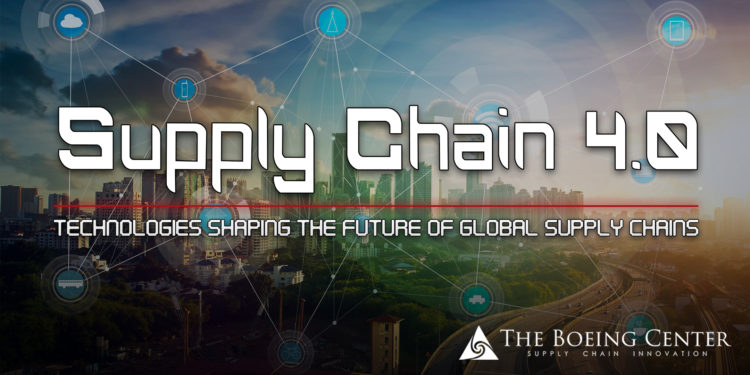The Boeing Center hosted its 9th annual Industry Conference in October, featuring presentations from experts operating at the forefront of supply chain innovation. The conference was an interactive exploration of the ever-changing trends in supply chain, such as automation, artificial intelligence and machine learning, fintech and blockchain, big data analytics, robotics, drones, 3D printing, and the Internet of Things. The presenters provided a variety of perspectives and unique insights on cutting-edge topics, and the attendees were able to exchange ideas with fellow industry professionals during breaks and lunch.
Panos Kouvelis, Director of The Boeing Center for Supply Chain Innovation and Emerson Distinguished Professor of Operations & Manufacturing Management, kicked off the conference. He primed the audience by discussing some of the technologies impacting corporate supply chains, and set the stage for the presentations to come. Then, Dan Coughlin of The Coughlin Company engaged the audience with a networking exercise that got attendees discussing implementation challenges to new technology adoption, as well as their recent successes.

The first speaker of the artificial intelligence and big data portion of the conference was Mary Ann Wagner, Senior Manager of Supply Chain Data Analytics at Boeing. Her presentation, “Boeing AnalytX: Transforming data to reveal insights—and empowering a world of limitless possibilities,” focused on machine learning and data analytics in the aerospace industry. She was followed by Kevin Deppermann, Chief Engineer Distinguished Fellow at Monsanto.
His talk, “Innovation in the Ag Supply Chain,” provided insight into Monsanto’s efforts to generate innovative engineering solutions for their customers through four main avenues: throughput (increasing speed and reliability), enabling (non-invasive, non-destructive testing), cost (resource reduction), and accuracy (screening, counting, measurement, scoring, and rating).

IBM Client Technology Leader Ed Corno then led the blockchain portion of the conference with his presentation, “THINK. Blockchain.” Corno began with a high-level overview of what blockchain is and how it’s relevant to business, discussing various blockchain applications and positing future possibilities for the technology.
Ryan Altemose, Head of Supply Chain Integration & Analytics at MilliporeSigma, talked about the opportunities and benefits of blockchain in the life sciences industry, as well as how the Internet of Things will shape the future of supply chain in the coming years.

The robotics and automation portion of the conference began with Kevin Lardner, Head of Operational Excellence & Global Strategic Projects at Merck Life Sciences. “Industry 4.0: Implementation Challenges in a Diverse Life Sciences Company” provided a background on the fourth industrial revolution and provided insight into the multitude of technological advances being used across the life sciences industry and beyond.
Next, Chris Krampitz, Principal Consultant at Stratasys, discussed the process of identifying value in a supply chain-wide deployment of additive technologies. Krampitz talked about the challenges addressed by additive manufacturing (AM), the potential benefits of enterprise-wide AM deployment, and the approaches to identifying the value of such an undertaking.
Anheuser-Busch InBev’s Dan Hazlett, Director of Logistics Solutions, and Eddie Davis, Senior Manager of Business Process Excellence, followed Krampitz’s presentation with an explanation of robotic process automation in the ABI supply chain.
They spoke about ABI’s project implementation methodology as it relates to technological innovations, and shared how ABI is using robotic automation to enhance product quality and improve on-time deliveries.

The final segment of the day focused on supply chain innovations in logistics and services. Rochelle Henderson, Senior Director of Research and Analytics at Express Scripts, talked about how Express Scripts is using data and technology (e.g., mobile apps) to enhance patients’ experience and help them live healthier lives.
Next up were Edward Jones’ Terrence Freeman, Director of Digital Product Management, and Jacob Heberlie, Director of User Experience. Their presentation, “Advancing Digital at Edward Jones,” showed how technology can be used in the financial services industry to improve user experience and client satisfaction.
Finally, Mark Southey, Executive VP of Business Development, and Dan Snow, Executive VP of Operations, from Traffix closed out the show with “Technology’s Impact on the SMB.” They explained how Traffix is using technology to optimize its role as a 3PL logistics company and bridge the gap between small-to-medium businesses and their much larger competitors.
The Boeing Center Industry Conference was a great opportunity for industry professionals, students, and supply chain enthusiasts to gain insights from some of the most technologically advanced companies and supply chains in the world. We will be releasing highlights from the presentations, so stay tuned to our social media channels (@theboeingcenter) and be sure to download our app for more exclusive content and information about future events!
• • •
A Boeing Center digital production
Supply Chain // Operational Excellence // Risk Management
Website • LinkedIn • Subscribe • Facebook • Instagram • Twitter • YouTube













